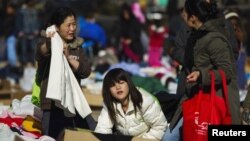NEW YORK —
Superstorm Sandy has left thousands of people homeless in the northeastern United States. But, cold weather could force more storm victims from their homes.
According to weather experts, the temperature in areas of New York and New Jersey hardest hit by Sandy could fall to one degree by Monday morning. Tens of thousands of people have been forced from their homes by the storm and the federal government, the states of New York and New Jersey, and the city of New York are trying to address the issue.
New York Governor Andrew Cuomo says despite not having electricity, many people do not want to leave their homes, but will be forced to do so because of the cold.
“It’s starting to get cold; people are in homes that are uninhabitable. It’s going to be increasingly clear that they’re uninhabitable when the temperature drops and the heat doesn’t go on. That’s when they are going to know they’re uninhabitable," he said.
Watch a Related Report by VOA's Adam Phillips
U.S. Homeland Security Secretary Janet Napolitano says the recovery effort must focus on moving storm victims from shelters into temporary housing.
New York City Mayor Michael Bloomberg has pledged to provide housing for those in need. “The magnitude of the problem is, we think, that we could have something between 30,000 and 40,000 people that we’re going to have to find housing for. We are working on it; we will continue to get this done," he said.
Many of those left homeless by last week's storm are from the hard hit area of Breezy Point, a section of the New York City borough of Queens. At least 100 homes were destroyed and 20 others were damaged when a natural gas explosion fanned by hurricane winds engulfed an entire neighborhood.
Nonetheless, resident T.J. Healey is optimistic. “It’s unimaginable. It’s hard to process. Nobody really got hurt. And this community will pull together. It’s a very tight knit community and we will pull together. We’ll be back," he said.
Although New York and New Jersey bore the brunt of Sandy's fury, the storm stretched some 1,600 kilometers, killing more than 100 people and knocking out power to 8.5 million homes and businesses,and causing as much as $50 billion in damage.
According to weather experts, the temperature in areas of New York and New Jersey hardest hit by Sandy could fall to one degree by Monday morning. Tens of thousands of people have been forced from their homes by the storm and the federal government, the states of New York and New Jersey, and the city of New York are trying to address the issue.
New York Governor Andrew Cuomo says despite not having electricity, many people do not want to leave their homes, but will be forced to do so because of the cold.
“It’s starting to get cold; people are in homes that are uninhabitable. It’s going to be increasingly clear that they’re uninhabitable when the temperature drops and the heat doesn’t go on. That’s when they are going to know they’re uninhabitable," he said.
Watch a Related Report by VOA's Adam Phillips
U.S. Homeland Security Secretary Janet Napolitano says the recovery effort must focus on moving storm victims from shelters into temporary housing.
New York City Mayor Michael Bloomberg has pledged to provide housing for those in need. “The magnitude of the problem is, we think, that we could have something between 30,000 and 40,000 people that we’re going to have to find housing for. We are working on it; we will continue to get this done," he said.
Many of those left homeless by last week's storm are from the hard hit area of Breezy Point, a section of the New York City borough of Queens. At least 100 homes were destroyed and 20 others were damaged when a natural gas explosion fanned by hurricane winds engulfed an entire neighborhood.
Nonetheless, resident T.J. Healey is optimistic. “It’s unimaginable. It’s hard to process. Nobody really got hurt. And this community will pull together. It’s a very tight knit community and we will pull together. We’ll be back," he said.
Although New York and New Jersey bore the brunt of Sandy's fury, the storm stretched some 1,600 kilometers, killing more than 100 people and knocking out power to 8.5 million homes and businesses,and causing as much as $50 billion in damage.




